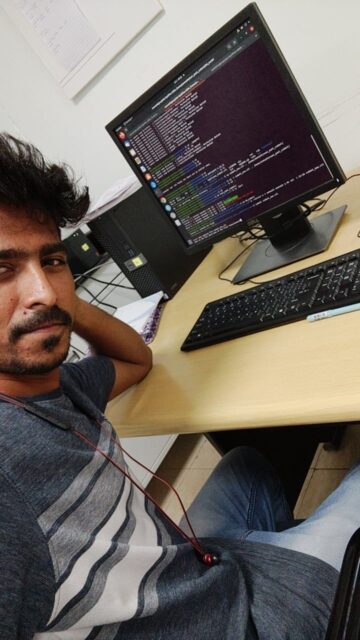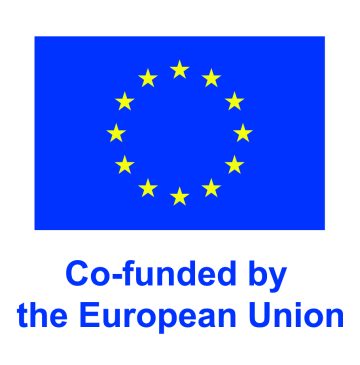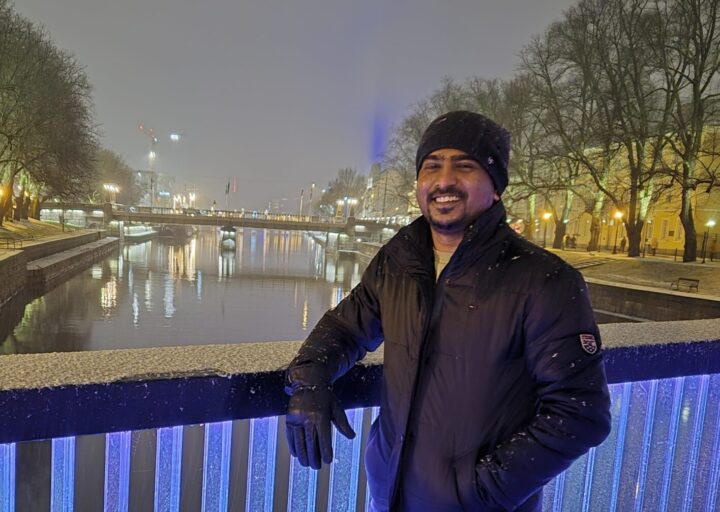Exploring Population Genomics and Sustainability: My Journey started with UTU-GreDiT
Embarking on a journey with UTU-GreDiT looks as if it can provide a transformative experience, with my passion for genetics with the mission of building a sustainable future. From navigating Finnish academia to human evolutionary genomics, this adventure looks very promising and enriching personally as it is professionally.
1. Getting PhD and Excitement:
It was early in 2024 when I first came across the advertisement for UTU-GreDiT. My initial thought was, what is this UTU-GreDiT? The name sounded intriguing and catchy, prompting me to read more about it. This program aims to train the experts required to deliver transformative change towards sustainable societies, with skills and knowledge to operate across different sectors. After reading it, I realized this is a great opportunity and initiative, with many projects enlisted in the advertisement from different disciplines, each to bring a transformative change towards sustainable societies, with skills to contribute at different levels.
What truly excited me was this specific project titled “Human Genomic Changes in North-Eastern Europe Due to Past Epidemics and Environmental Changes”. As someone who has been fascinated by DNA and its central role in biology and inheritance since my high school days, I felt an immediate connection with this project. Back then in my past academic ventures, I didn’t exactly know where this fascination towards genetics would lead me, but I was determined to build a career in a field related to genetics. To pursue this dream, I earned my bachelor’s degree in microbiology. Over time, my interest in genetics grew stronger, which led me to pursue a master’s degree in molecular and human genetics. During my master’s studies, I explored various human genetic disease mechanisms, focusing on how disease susceptibilities vary among populations influenced by factors such as inbreeding, selection, and admixture. This experience deepened my interest in evolutionary genomics, with an emphasis on population-specific adaptations, while further refining my skills in genomics and bioinformatics.

Throwback to my early days in the previous research lab: navigating my desktop, where my passion for genetics first took root, and hours of learning and research interest shaped my journey in population genomics.
When I discovered the UTU-GreDiT project on human genomics in northeastern Europe, I immediately knew it was the perfect fit for my interests and expertise. The project’s focus on understanding how past epidemics and environmental factors have influenced human genetic adaptations was what interested me the most. This project offered a unique opportunity to explore evolutionary genomics on a broader scale while contributing to transformative research aimed at building sustainable societies. The application process was very exciting. I prepared my application to highlight my academic background, research experience, and passion for the advertised project. Although preparing the research plan was the most challenging part of the application process, but I relied on my knowledge and further literature readings about ancient DNA (aDNA) and population genetics to develop a research plan. Eventually, my application got shortlisted, and I was invited for an interview.
During the interview, I presented my research plan and was questioned by supervisors and the selection committee. After a couple of weeks, I received an email about my selection, which was one of the happiest moments of my life. It was a dream come true to be part of a program like UTU-GreDiT, where I could contribute to research with real-world impact while advancing my academic career. The opportunity to work in Finland, a country known for its commitment to sustainability and innovation, made it even more special, I am grateful for every step that brought me here—from discovering my fascination with DNA in high school to immersing myself in evolutionary genomics during my master’s. Joining UTU-GreDiT feels like the culmination of years of curiosity, work, and a desire to make a difference.
2. Adjusting to Finnish Academia
Coming from India, where I could observe academic hierarchy, the Finnish academic experience has been so different for me. Finnish academia, in particular, is notable for its strong work ethic, and the people in our department have been very supportive. The Finnish academia has a distinct culture of equality and mutual respect, which has been a major adjustment for me. From the very first day at the university, I noticed how smoothly everything was arranged for a newcomer. From getting agreements signed with HR, being welcomed by my supervisor, setting up a UTU account, and attending events such as UTUGS and UTU-GreDiT introductions, to receiving instructions on studies, intranet, and intranet tools, and coursework—it was all very easy to understand for someone who had just joined.
My supervisor even introduced me to the university canteen, where I had my first lunch at the university (although it felt early in the afternoon for me—later I learned that lunch is generally earlier in Finnish culture compared to my place). Fair enough! One of the aspects of Finnish academia that stands out is its commitment to work-life balance. There is a strong emphasis on maintaining boundaries between work and personal life. Additionally, my supervisor and colleagues have been extremely helpful, even offering advice on how to take care of myself during the winter. I also appreciate how meetings are structured to provide important feedback and foster collaboration for improvement.
3. Learning things in Finland and Sauna.
I arrived in Finland in September, greeted by the fresh air of Helsinki and the wide, open sky. It symbolically felt meaningful, as though the world was opening up to me. The colors of Finnish autumn were beautiful and captivating, slowly transitioning into the beginning of the winter. People say Finland’s winter is both tough and beautiful. The shorter days and snow-covered landscapes created a calm and quiet atmosphere, but adapting to the cold required preparation. My colleagues were kind enough to share tips on staying warm and dressing properly, which can make the transition much smoother.
One of the most interesting Finnish traditions I’ve experienced is the sauna. My first sauna session was during a seminar trip to Seili with the Human Diversity Consortium people. After the sessions, everyone suggested we try the sauna, followed by a dip in the Baltic Sea. Although I was nervous at first, I decided to give it a try and it was worth it. The mix of the sauna’s intense heat, the cold water of the Baltic Sea, and the shared experience with colleagues was something I’ll never forget. During this time sunset and the half-moon reflected on the water, I realized this was more than just a way to relax—it was a cultural tradition that showed the Finnish way of balancing life’s challenges with moments of peace.
4. PhD topic and UTU-GreDiT
Now it’s time to discuss the main topic: the UTU-GreDiT program and my PhD project. Due to climate change and environmental shifts, many significant changes are happening as we transition from the green age to the digital age, making urgent action necessary.
The Solutions for Green and Digital Transition (UTU-GreDiT) program, led by the University of Turku (UTU), Finland, is a unique COFUND doctoral training program. It aims to train experts capable of delivering transformative change toward sustainable societies, equipping them with the skills and knowledge to operate across sectors at regional, national, and international levels. UTU-GreDiT is co-funded by the European Union’s Horizon Europe Research and Innovation Program’s Marie Skłodowska-Curie Action. My project is part of UTU-GreDiT, and it focuses on understanding how the human genome changed due to past exposure to pathogens and environmental changes. Identifying these important changes through the genomic landscape has become crucial, as these changes have had significant effects. This is exciting aspect of my research is studying whether adaptations to past epidemics can help predict genetic signatures of future pandemics. Of course, this is a very complex and challenging question to answer.
With the facilities, collaboration, and mindset in our research group, is determined to understand the prehistory of the northeastern European population through integrating population genomics, and archeology. In my project analysis will not be limited to modern DNA data but will also include ancient DNA and historical life history trait data, which makes this research even more exciting. One of the coolest aspects of my PhD is becoming a part of the Human Diversity Consortium (https://sites.utu.fi/humandiversity/) at the University of Turku. This is an interdisciplinary research consortium that focuses on how population encounters influence human diversity, encompassing genetics, linguistics, archaeology, and digital humanities. Being part of a consortium has allowed me to learn from experts across diverse fields and explore innovative ways to analyze population diversity. It has also helped me appreciate the interdisciplinary approach to studying archaeology, linguistics, evolutionary health, and genetics, showcasing the richness of human history.
5. Future Directions and Aspirations
As I progress through my PhD journey within the UTU-GreDiT program, my aspirations are becoming clearer. My primary goal is to contribute to research that enhances our understanding of human genomic adaptations to past epidemics and environmental changes. This knowledge has the potential to inform public health strategies, particularly in predicting and mitigating the effects of future pandemics. I aim to broaden my expertise in bioinformatics and evolutionary genomics, leveraging the interdisciplinary opportunities UTU-GreDiT offers. Collaborating with researchers across different fields—such as immunology, epidemiology, and history—will allow me to approach complex questions from multiple perspectives. I am particularly interested in exploring the ethical dimensions of genomic research, ensuring that its applications benefit society while respecting cultural and individual diversity. Beyond my research, I hope to actively participate in knowledge dissemination and public engagement. Communicating scientific findings to non-specialist audiences is crucial, especially when addressing topics like genetics, which often evoke ethical and societal concerns. I plan to use platforms such as workshops, public talks, and social media to bridge the gap between academia and the broader community.
End of the blog, but start of the journey
Joining the UTU-GreDiT program has been a transformative experience, blending academic rigor with personal growth. From the excitement of discovering the program to adjusting to Finnish academia and embracing the unique cultural experiences of Finland, this journey has been both challenging and rewarding. My PhD project on human genomic adaptations to past epidemics is not just a professional milestone but a meaningful pursuit that aligns with my long-standing fascination with genetics. Looking ahead, I am motivated to contribute to transformative research, and interdisciplinary collaboration, and make a lasting impact on both science and society. The path is not without its hurdles, but with the support of UTU-GreDiT, my colleagues, and supervisors, I am ready to embrace the opportunities and challenges that lie ahead.
 Co-funded by the European Union. Views and opinions expressed are however those of the author(s) only and do not necessarily reflect those of the European Union or European Research Executive Agency (REA). Neither the European Union nor REA can be held responsible for them.
Co-funded by the European Union. Views and opinions expressed are however those of the author(s) only and do not necessarily reflect those of the European Union or European Research Executive Agency (REA). Neither the European Union nor REA can be held responsible for them.
